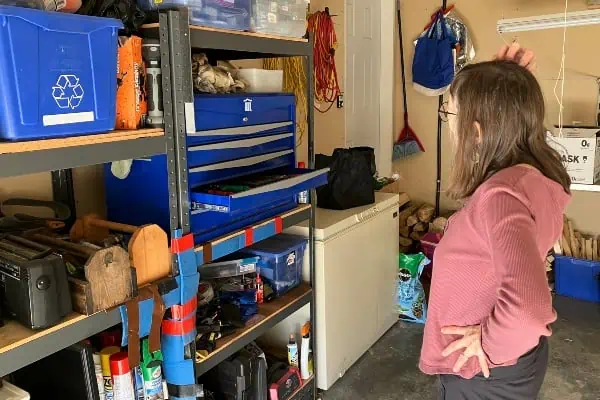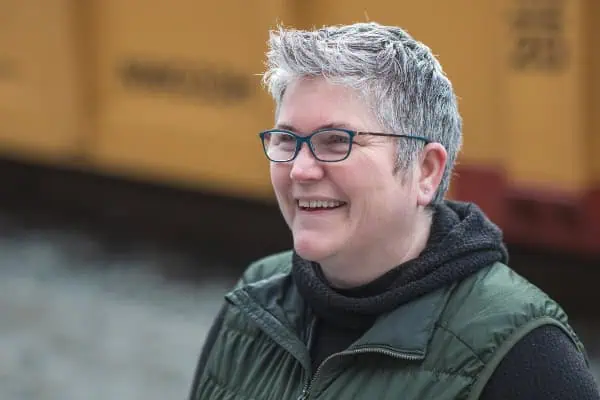In a memorable scene in the 1983 movie Never Cry Wolf (adapted from Farley Mowat’s 1963 book), a biologist is dropped by floatplane in the middle of the high arctic tundra. He is completely alone, except for a small collection of wooden crates packed with his research and living supplies. The camera pans out until the biologist is a speck in a vast sea of snow and sky.
Thanks to the efforts of the Polar Continental Shelf Program (PCSP) in Resolute, Nunavut, researchers do not have to fear desolate isolation or lack of supplies depicted in movies. Each year, adventurous folks like Whitehorse resident Jutta Hopkins-Lecheminant bring supplies to researchers. If you have ever wondered what it is like to work in the high arctic, you now have a chance to hear about it first hand. Hopkins-Lecheminant will be speaking about her arctic experience on Oct.1 at noon at the Yukon College.
Hopkins-Lecheminant was employed by PCSP, a national service delivery organization that aides in the complex logistics of conducting research in the high arctic. They coordinate charter air transportation to remote field camps, and loan communication, field and transportation equipment, fuel, accommodations, and lab/research space at their facility. Through this work the PCSP touts its role in the implementation of Canadian arctic sovereignty.
PCSP is also the heart of a communications network that links the scientific teams in field camps dispersed throughout the Arctic.
This summer, 10 PCSP workers provided deliveries and support for 1,100 scientists conducting more than 165 projects across 60 field camps in the arctic.
Hopkins-Lecheminant, was one of the 10 employees. She spent six weeks this summer working with PCSP during the anchor leg of the season, mid-July to near the end of August.
Hopkins-Lecheminant grew up in Whitehorse and is currently studying in the mineral resource department at Yukon College. When she heard that PCSP was seeking one student from each northern territory for work this summer, she thought the job was an adventure she could do.
Her daily tasks supported many different types of researchers who were stationed in the arctic.
“All sorts,” Hopkins-Lecheminant says. “A biologist, geologist, climatologist, glaciologist, and every other kind of ologist that wants to study the arctic. I talked to all sorts of scientists while I was there, but I admit, I did get excited when a geologist was there. I did my best to have a quick chat and if they had time, ask all sorts of questions.”
I imagine these isolated researchers enjoyed the chance to answer questions and chat with a friendly face – way, way out there in the ice and snow. Visitors to field camps are not common and long-distance travel in the arctic requires a dog team or specialized vehicles. PCSP workers make deliveries by land on ATVs, and through the air by helicopter, and Twin Otter plane. Although a regular part of the job, Hopkins-Lecheminant says that the flying scares her.
“Mostly because I am not in control and I don’t completely understand what keeps a tin can with wings or rudders in the air,” she says. “However, I did not let that fear get in the way of enjoying the once-in-a-lifetime opportunities that I was given. I went for my first helicopter ride and it was nothing close to what I expected, it is like floating.”
These once in a lifetime opportunities: helicopter trips, seeing endangered wildlife, and experiencing the vast spaces of the changing arctic are part of working with PCSP.
“I would do this job again in a heart beat,” Hopkins-Lecheminant says. “And I would recommend that students apply for this job if they like hard work, new experiences, science, cold places, long days and the feeling of happiness and satisfaction that you feel after you know that you have worked hard and made a difference.”
Hopkins-Lecheminant hopes to make a difference in the arctic again next year. While she is happy to share her experience with others, Hopkins-Lecheminant jokes that her work stories may lead to an increase in PSCP hopefuls.
“I’m excited to share my pictures, rocks and stories from the time I spent in Resolute – but I’m also a little apprehensive,” she says. “What if I do a good job and way more students apply for the job next year?”
Jutta Hopkins-Lecheminant’s talk takes place on Tuesday, Oct.1 from noon to 1 p.m. in room A2103 of the Yukon College – bring your lunch. This talk is part of the Brown Bag Lunch free speaker series, which began in 2011 to highlight the work and ideas of the college’s researchers.
For more information go to www.YukonCollege.yk.ca/hub/brownbag




